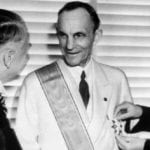 Mysteries
Mysteries  Mysteries
Mysteries  History
History 10 Surprising Stories About the Texas Rangers
 Humans
Humans 10 Philosophers Who Were Driven Mad by Their Own Theories
 Miscellaneous
Miscellaneous 10 Video-Game-Worthy Weapons and Armors from History
 Weird Stuff
Weird Stuff 10 Psychics Who Accurately Predicted Wartime Events
 The Arts
The Arts 10 Pieces of Art Inspired by a Broken Heart
 Health
Health 10 Science Fiction-Sounding New Medical Treatments
 History
History 10 Surprising Facts About the Father of Submarine Warfare
 Space
Space Ten Astonishing New Insights into Alien Worlds
 Weird Stuff
Weird Stuff 10 Bizarre Summer Solstice Rituals Still Practiced Today
 Mysteries
Mysteries Top 10 Haunting Facts About the Ghost Ship MV Alta
 History
History 10 Surprising Stories About the Texas Rangers
 Humans
Humans 10 Philosophers Who Were Driven Mad by Their Own Theories
Who's Behind Listverse?

Jamie Frater
Head Editor
Jamie founded Listverse due to an insatiable desire to share fascinating, obscure, and bizarre facts. He has been a guest speaker on numerous national radio and television stations and is a five time published author.
More About Us Miscellaneous
Miscellaneous 10 Video-Game-Worthy Weapons and Armors from History
 Weird Stuff
Weird Stuff 10 Psychics Who Accurately Predicted Wartime Events
 The Arts
The Arts 10 Pieces of Art Inspired by a Broken Heart
 Health
Health 10 Science Fiction-Sounding New Medical Treatments
 History
History 10 Surprising Facts About the Father of Submarine Warfare
 Space
Space Ten Astonishing New Insights into Alien Worlds
 Weird Stuff
Weird Stuff 10 Bizarre Summer Solstice Rituals Still Practiced Today
10 People with Heightened Senses
In our everyday lives, we use our eyes, ears, skin, and even our nose to help us traverse the environment and make decisions. Our senses are our friends, and we use them from sniffing the milk container to checking if the street is safe to cross to avoid a disaster.
These abilities are common among people and are not something extraordinary. However, there are some out there who are blessed with extrasensory perceptions that the rest of us lack. They may even be described as superpowers. Check out these 10 examples of people who have heightened senses, which may or may not make you envious of them.
Related: 10 Amazing People With Hypertrichosis
10 Pharrell Williams
Pharrell Williams is most recognized for his Grammy-winning work as a pop/R&B artist and producer, including the massive No. 1 hit song “Happy” from the Despicable Me 2 (2013) soundtrack album.
Williams claims to have synesthesia, a perceptual condition in which activation of one sensory or cognitive route causes involuntary sensations in another. For example, when a person with synesthesia hears their name, they may smell pears.
In the case of Pharrell Williams, he claims to have a sophisticated sense of musical color. The artist admits he can’t see colors while listening to music, but he can hear two sounds and mentally correlate them. He may determine whether they have the appropriate “colors” to blend harmoniously.
Synesthesia is important to Williams’s creative process and his overall worldview. He explained, “It’s my sole reference for comprehending.”
“The capacity to see and feel [in this manner] was a gift that I didn’t have to have. And I’m not sure I could produce music if it were abruptly taken away from me. It would be impossible for me to keep up,” Williams remarked.
9Concetta Antico
The majority of us can only perceive a limited number of hues or colors from our surroundings, which may number in the millions. If you think that is already a lot, consider someone who can see 99 million more colors than you. Concetta Antico, the world’s only tetrachromatic artist, is an example.
Tetrachromacy is a hereditary condition in which a small percentage of the global population has more receptors in their eyes than a normal person, allowing them to detect more colors.
Concetta Antico perceives more than green in a tree leaf, stating, “around the rim, I see orange, crimson, or purple; in the shadow, you may see dark green, but I see violet, turquoise, or blue.”
Antoci’s tetrachromacy translates to her vibrant and colorful paintings, and you can see them on her website, concettaantico.com. The crazy part is that her parents first mistook her for color blind or daltonic since she detailed hundreds of hues that only she could see!
8Ben Underwood
You are mistaken if you believe that figures like Daredevil, a blind superhero, only appear in fantasy. Throughout history, certain people could not see but could act as if nothing was wrong. Ben Underwood was one of them.
Ben was born and grew up in Elk Grove, California, near Sacramento. Due to retinal cancer, Ben was completely blind at three. Even though he can’t see, that doesn’t mean Ben can’t move around.
At the age of five, he taught himself to discern the location of items by producing regular clicking noises with his tongue. He utilized it to do activities like running, playing basketball and football, cycling, and skateboarding.
Everything Ben did virtually without the slightest difficulty. After being investigated, it turns out that Ben can see using the help of sonar and sound, aka echolocation—an ability possessed by bats and other animals with very low vision.
Overall, things were going relatively well for him, and his peers and families were looking forward to spending more time with him. Unfortunately, fate said otherwise. Ben died on January 9th, 2009, at the age of 16. According to his website, he died of cancer at his home. Even though he is no longer with us, his tale continues to inspire many others.
7Vincent Van Gogh
Vincent van Gogh’s paintings are recognized for their brilliant colors and expressive movement thanks to his skills, but there may be more behind the story. Many art historians believe Vincent van Gogh suffered from chromesthesia, a type of synesthesia in which a person links colors with sounds.
“Some painters have a jittery hand at sketching, which lends their skill something of the tone distinctive to a violin,” Van Gogh writes to his brother.
Unfortunately, he appears to have been one of the synesthetes who was more hampered by his condition than empowered. One study emphasized the negative effects of Van Gogh’s chromesthesia. When he began piano lessons in 1885, his teacher noticed he connected various notes with different colors. Unfortunately for Van Gogh, the teacher mistook this for lunacy and expelled him.
6Natasha Demkina
Natasha has something unique, namely eyes with x-ray abilities. Her abilities began to manifest at the age of 10. “I was at home with my mother, and suddenly I had a vision. I could see inside my mother’s body, and I started telling her about the organs I could see. Now, I have to switch from ordinary vision to ‘medical vision.’ I see a colorful picture inside the person for a split second, and then I analyze it,” said Demkina.
After describing her mother’s internal organs to her, Demkina’s story spread by word of mouth among the locals. People began to gather outside her door seeking medical consultation. This discovery attracted the interest of groups from London, New York, and Tokyo, all of whom invited Demkina to demonstrate her abilities.
Demkina’s ability is super powerful. That said, many people and experts doubt her ability. Instead, they believed that Natasha was utilizing “cold reading,” a deceptively simple yet effective method commonly used by astrologers, psychics, and fortune-tellers.
Regardless, Demkina claims she could see that one of her subjects had a prosthetic knee. She was also able to determine that another person has asymmetrical internal organ positions. She can also see the early stages of pregnancy and even the fetus in pregnant women. Remarkable, isn’t it?
5Stephen Wiltshire
Stephen Wiltshire is a one-of-a-kind London-based artist. In what way? He can recreate vast landscapes in great detail merely by staring at them for a few seconds. With only a quick helicopter trip above Dubai, Tokyo, Hong Kong, Rome, and New York City, he can recall and sketch exquisite aspects of the skylines of each city.
Wiltshire, who is autistic and didn’t talk until he was five, had a photographic memory that he used to replicate the precise number of columns of the Pantheon in his panoramic sketch of Rome. Wiltshire has savant syndrome as well. People with this condition frequently have a variety of developmental impairments, including autism, but they usually have exceptional aptitude in one field—often mathematics, mechanics, art, or music.
Because of his syndrome, Stephen was given an advantage (superpower, if you will) in remembering details and drawing them with his photographic memory. One of his noteworthy drawings is the Tokyo cityscape drawn on a 10-meter-long (32-foot) paper in one week. He has also accomplished comparable achievements on a similar piece of paper depicting the Hong Kong cityscape.
4James Holman
What would you do if you joined the army, rose to the rank of lieutenant, and thought everything was going well, only to have it all snatched away by a disease that destroys your joints and blinds you? Many individuals, I imagine, would prefer to stay at home and recuperate. However, James Holman, a guy from Exeter, England, did not choose this path.
James Holman was treated as a retired veteran in a military installation because of his disability. However, instead of simply lounging around, he requested permission to leave the installation and see the world. James began employing an echolocation technique nearly solely employed by some wild creatures. He’d tap his cane on the ground or a nearby item, and with enough practice, he was able to notice how the sound rebounded off different surfaces, allowing him to “see” if the terrain was rising or if there were walls, barriers, or even cliffs in his way.
He traveled across France, Italy, Switzerland, and Germany using this approach and even had time to write his first book, The Narrative of a Journey through France, while completely blind. These were not his final trips, and he used his exceptional aptitude to travel as far as Russia and Turkey. He was one of the first humans to utilize echolocation, but more people are utilizing it nowadays to find new and unexpected areas to explore.
3Ramin Djawadi
Ramin Djawadi is a composer born in Iran who now lives in Germany. He is most known for his soundtracks for the Marvel Studios film Iron Man (2008) and the Game of Thrones series, for which he received Grammy nominations in 2009, 2018, and 2020. In addition to his musical abilities and passion for the craft, Ramin has something more going for him that he claims helps him visualize music.
Like Pharrell Williams, Ramin also has the sensory condition known as synesthesia, which allows him to correlate colors with numbers and numbers with colors. Perhaps this is one of the main reasons he can play music without a sheet but from memory instead.
“It was actually discovered by my wife,” he explains. “She’d always inquired about my creative process and how I compose music, so I just told her about it. I see it in visuals, and all the colors come to me, as well as notes and melodies, and I had no idea there was a name for it.”
2Nikola Tesla
Imagine being struck by blinding flashes of light enveloping your head and filling your brain. Yet, inside those blinding flashes comes a vision or image that solves an issue you’ve been pondering or an innovative concept. Nikola Tesla, widely known for his work with alternating current electricity, was inspired by his synesthesia and became a prolific innovator.
Nikola Tesla’s achievements are still underappreciated today. While Edison is credited for inventing the light bulb, Tesla’s alternating current is responsible for most of the world’s electricity. He is credited for creating the fluorescent bulb, neon light, radio technology, and the internal combustion engine spark plug.
He also laid the foundation for the electron microscope, radar, and microwave ovens. He even experimented with robots, which was rather advanced for his day.
Not only that, Tesla was a voracious reader and is said to have possessed an eidetic memory, which goes beyond photographic memory in terms of visual recall. He is believed to have had whole designs of inventions in his head, often working from memory and without bothering to sketch them.
1Pam Gilbert
Pam Gilbert began to hear things that others couldn’t. The noises then seized control of her life. Pam Gilbert’s hearing appeared to be a superpower ability at first. When she was on the second story of her house, she could hear the faucet in the basement trickling or her kids turning over in the next room. But it rapidly became a nightmare when she realized she could hear the noises of her own body—her heart pounding in her ears and even her eyeballs shifting from side to side.
Superior canal dehiscence syndrome (SCDS) is a devastating and rare inner ear condition that impairs Gilbert’s hearing and balance. Gilbert describes the sounds she’s hearing as “unshakable noises.”
“They never went away, and there was no way to turn them down. The bones in my neck were breaking like sandpaper, and I could hear it. I could hear my eyeballs moving at one point,” Pam Gilbert detailed the situation. Gilbert confesses that her sanity is eroding as a result of her condition.
Gilbert, fortunately, had surgery on March 4th, 2011. The operation went well. Gilbert felt a sensation of serenity and that her hearing had returned to normal.








